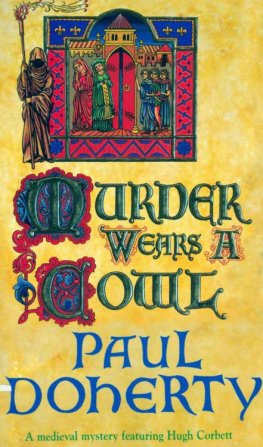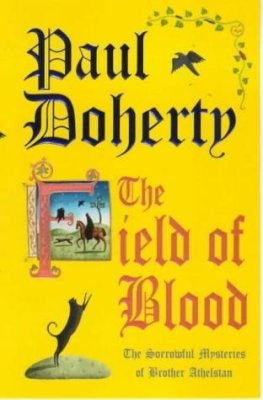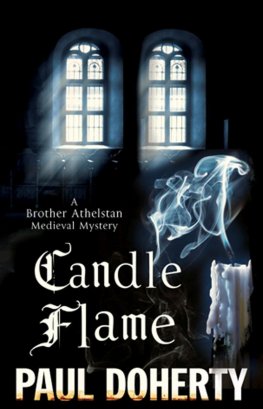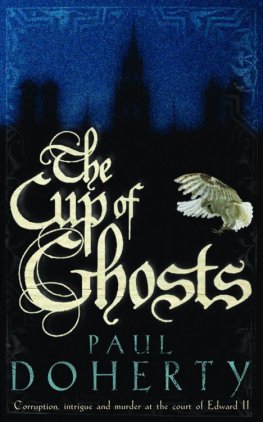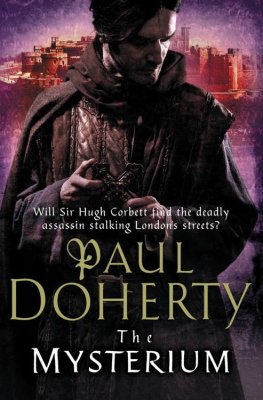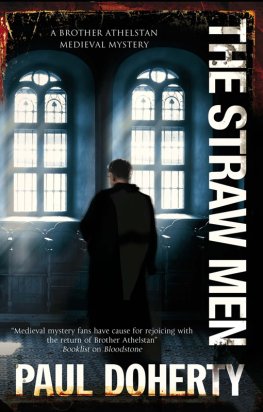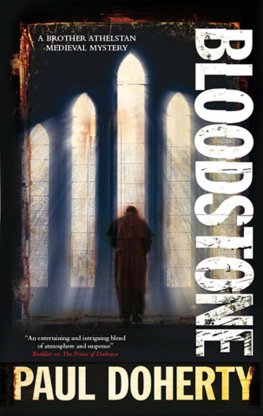Paul Doherty - Murder Wears a Cowl
Here you can read online Paul Doherty - Murder Wears a Cowl full text of the book (entire story) in english for free. Download pdf and epub, get meaning, cover and reviews about this ebook. year: 2012, publisher: Headline, genre: Detective and thriller. Description of the work, (preface) as well as reviews are available. Best literature library LitArk.com created for fans of good reading and offers a wide selection of genres:
Romance novel
Science fiction
Adventure
Detective
Science
History
Home and family
Prose
Art
Politics
Computer
Non-fiction
Religion
Business
Children
Humor
Choose a favorite category and find really read worthwhile books. Enjoy immersion in the world of imagination, feel the emotions of the characters or learn something new for yourself, make an fascinating discovery.
- Book:Murder Wears a Cowl
- Author:
- Publisher:Headline
- Genre:
- Year:2012
- ISBN:9780755350346
- Rating:5 / 5
- Favourites:Add to favourites
- Your mark:
- 100
- 1
- 2
- 3
- 4
- 5
Murder Wears a Cowl: summary, description and annotation
We offer to read an annotation, description, summary or preface (depends on what the author of the book "Murder Wears a Cowl" wrote himself). If you haven't found the necessary information about the book — write in the comments, we will try to find it.
Murder Wears a Cowl — read online for free the complete book (whole text) full work
Below is the text of the book, divided by pages. System saving the place of the last page read, allows you to conveniently read the book "Murder Wears a Cowl" online for free, without having to search again every time where you left off. Put a bookmark, and you can go to the page where you finished reading at any time.
Font size:
Interval:
Bookmark:
Paul Doherty
Murder Wears a Cowl
Prologue
The creaking of the scaffold rope was the only sound to disturb the dark silence which hung like a cloud over the great open expanse outside St Bartholomews in West Smithfield. During the day the area bustled with colour and noise but, at night, the ghosts would claim it for their own. The great scaffold with its out-jutting beams and yellow knotted ropes was a common sight, as were the corpses which dangled there, necks twisted, eyes protruding, swollen tongues clenched between yellow teeth. The city fathers decreed that executed malefactors should always hang for three days until their bodies started to rot and the sharp-beaked ravens began to gouge the eyes and soft flesh of the face.
No one ever approached that scaffold at night. The old hags claimed the Lords of Hell came to dance there. Even the dogs, cats and kites of the city left the place alone once darkness had fallen. Ragwort, the beggar, however, thought different. During the day Ragwort always sat at the corner of St Martins Lane in West Cheap, his copper-begging bowl extended as he whined for alms from the faithful, the rich and the patronising as they crossed Londons great market place to do business at St Pauls. At night, however, Ragwort moved back to Smithfield, to sleep beneath the scaffold. He felt protected there. No one would dare accost him and he accepted the grisly corpses hanging above him as his companions, even protectors against the robbers, thieves and nightwalkers who plagued the narrow alleyways of London. Sometimes, when he could not sleep, Ragwort would crouch on the wooden slats he used as legs and chatter like a magpie to the corpses. He would wonder about their lives and what had gone wrong. They were the best, indeed the only listeners, to his own dismal tale: how he had been a soldier, born and bred in Lincolnshire, before becoming an archer in Edward of Englands army in Scotland. How he had attacked a castle with scores of his companions, climbing the scaling ladders and then how God, aided and abetted by a red-haired Scotsman, had brought him low as hell. The ladder had been overturned, Ragwort had fallen into the dry moat and, when he had tried to crawl away, his legs had been drenched in sticky, burning, black oil. He had screamed for days, twisted in agony for months after the surgeons neatly chopped both legs off beneath the knee and strapped on wooden slats. Ragwort had been given a few coins, put on a cart and sent south to London to beg for the rest of his life.
Ragwort had come to terms with this. He had good custom and the great lords and the fat lawyers were generous patrons. He ate well, drank a flagon of red wine each day and, when the weather turned cold, the good brothers in the hospital of St Bartholomews always allowed him to sleep in their cellars. Ragwort claimed he had visions, strange fancies which plagued his dreams: sometimes he was sure he saw red-horned demons walking the streets of London. On the evening of May 11th 1302, as Ragwort made himself comfortable beneath the swinging corpses, he had another premonition of impending evil: the stumps of his legs ached, he had a prickling at the back of his neck and his stomach bubbled like a pot of seething fat. He slept fitfully for a while and woke just as a strong breeze sprang up to send the cadavers above him twisting and turning in some macabre dance of death. Ragwort tapped the soles of one of the corpses feet.
Shush! he whispered. Let old Ragwort listen!
The beggar crouched like a dog, his ears straining into the darkness. Then he heard it, the slap of sandals on the cobbles and the sound of heavy breathing: a dark figure hurried towards him. Ragwort drew back into the darkness, almost hiding behind the legs of the corpses hanging there. He peered at the approaching figure. Who was it? A woman? Yes, a woman. She was wearing a dark gown and her footfall was heavy. An old woman, Ragwort concluded, as he caught a glimpse of grey hair beneath the hood and the slightly hunched shoulders. She seemed in no hurry and posed no threat so Ragwort wondered why his heart kept pounding, his throat turned dry and a terrible coldness caught the nape of his neck, as if one of the hanged men had stooped down to stroke him gently. Then Ragwort knew the reason. He heard another footfall, someone was hurrying behind the woman. This person moved with speed and greater purpose. The first figure stopped as she, too, heard the pursuing footsteps.
Who is there? the old woman called out. What do you want?
Ragwort tensed, pushing his fingers into his mouth. He felt the evil approach. He wanted to shriek out a warning. Something dreadful was going to happen. A second shape appeared out of the darkness and moved towards the old lady.
Who are you? she repeated. What do you want? I am on Gods business.
Ragwort moaned gently to himself. Couldnt the woman see? he thought. Couldnt she sense the malevolence creeping through the darkness? The second figure drew closer. All Ragwort saw was a hood and a gown. As the moon slipped from between the clouds, he caught the gleam of white flesh and saw that the second stranger also wore sandals. The old woman relaxed.
Oh, its you! she snapped. What now?
Ragwort couldnt hear the muttered reply. The two figures drew together. Ragwort saw a flash of steel and hid his eyes. He heard the gentle slash of a razor-edged knife cutting skin, vein and windpipe. A dreadful scream shattered the silence, cut off by a terrible gurgle as the old woman, choking on the blood which gushed up into her throat, crumpled to the cobblestones. Ragwort opened his eyes. The second figure had gone. The old lady lay in an untidy heap. She moved once but Ragwort sat transfixed by terror at the thin stream of blood snaking across the cobblestones towards him.
Later that same week in a garret at the top of a decaying mansion on the corner of Old Jewry and Lothbury, Isabeau the Fleming carefully counted out the coins in neat little stacks, the fruits of her hard nights work. She had accepted three visitors: a young nobleman, lusty and vigorous, a yeoman from the Tower garrison and an old merchant from Bishopsgate who liked to tie her up whilst he lay beside her. Isabeau grinned. He was always the easiest, so quickly pleased and so generous in his thanks. Isabeau drew the ribbons from her bright red hair and shook her locks loose over her shoulders. She shrugged off the dress of blue damascene and threw it, together with her undershift and gartered hose, into a crumpled heap. She stood and turned before the shining piece of metal which served as a mirror. She always went through the same ritual every night. Old Mother Tearsheet had advised her to do this.
A courtesan who looks after herself, Isabeau, the old beldame had cackled, stays younger and lives longer. Always remember that.
Isabeau went over to the pewter bowl which stood on the lavarium and, using a sponge and a piece of Castillan soap, provided by a grateful Genoese captain, carefully washed her smooth, alabaster-white body. She jumped as a small bird, fluttering under the eaves of the old house, dashed itself against the shutters. A cat, hunting in the dark alleyway below, sang a screeching song to the moon. Isabeau stopped and listened to the old house creaking on its timbers. She must be so careful. The killer had already slain fourteen, or was it more, of her sisters? Their necks slashed so roughly, their heads dangled to the rest of the body only by strips of bone and muscle. She had seen one, the corpse of Amasis, the young French whore who used to trip so daintily up and down Milk Street looking for custom. Isabeau went back to her washing, enjoying the sensuous feel of the sponge against her skin. She cupped her full young breasts and ran her hand over her muscular, flat stomach. She heard a sound on the stairs but dismissed it as some foraging rat, seized a napkin and began to dry herself. She turned, moving the candle to a small chest next to the huge bed, covered with a swan-feather mattress, and donned a crumpled nightgown.
Font size:
Interval:
Bookmark:
Similar books «Murder Wears a Cowl»
Look at similar books to Murder Wears a Cowl. We have selected literature similar in name and meaning in the hope of providing readers with more options to find new, interesting, not yet read works.
Discussion, reviews of the book Murder Wears a Cowl and just readers' own opinions. Leave your comments, write what you think about the work, its meaning or the main characters. Specify what exactly you liked and what you didn't like, and why you think so.

